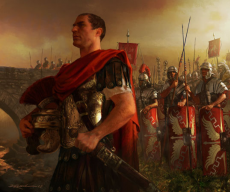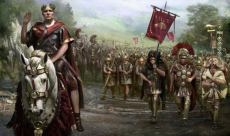
Following Marius' military reforms the more ambiitous men in Rome began to realise the potential for great power. During Sulla's march on Rome (the second civil war between him and Marius) Gnaeus Pompeus Magnus (Pompey the Great) had proved himself as a very capable young military general. By the time both Sulla and Marius were dead he had become an incredibly wealthy and powerful general and politician. Arguably the only reason Pompey did not claim Rome for himself was that he was too arrogant and lacked further ambition, believing he already had ultimate power. His main rival became the famous Gaius Julius Caesar, nephew of Marius, but it is important that we understand his history before considering his rivalry with Pompey.
Caesar was concerned at how Sulla might have treated him becasue he was Marius' nephew so he left Rome and joind the military serving in Asia. He returned to Rome upon hearing of Sulla's death and became an orator, gaining the favour somewhat of a powerful ally, the Roman orator and lawyer named Cicero. Despite having to flee Rome at a young age this did not hinder Caesar who showed drive and ambition throughout his career. When returning to Rome he was kidnapped by pirates and maintaind an heir of authority whilst with them, insisting that they raise the ransom money from 20 to 50 silver talents because he was insulted at how little they thought him worth. He promised them whilst captive that he would have them crucified which they took as a joke but, true to his word, upon his release Caesar mustered a fleet, tracked them down and had them crucified. Having by this point begun to progress through the Roman career path (Cursus Honorum) Caesar travelled to Spain to oversee military conquest there and is said to have encountered a statue of Alexander the Great. It depressed him that at his age Alexander had conquered half the world and, ever the ambitious man, Caesar vowed to better Alexander the Great. Having conquered two tribes in Spain Caesar was allowed a Triumph but could not run for Consulship if he did so as he would be a soldier not a politician and he chose to be Consul instead. It is worth noting that at this point Caesar had debts and allied with the wealthy man Marcus Licinius Crassus aswell as Pompey, well aware that he would be a major rival in his rise to power. This three way alliance became known as the first triumvirate, but it did not last. Crassus, aware that he needed military glory, set off to fight the Parthians in Asia but the campaign was a failure and he was killed. Well aware that he he needed more military glory in order to better Pompey Caesar set off for his campaign of Gaul.

The senate did not believe that Caesar could conquer Gaul (modern day France) with just his own army but after he defeated Vercingetorix's confederation of gallic tribes at the battle of Alesia, outnumbered by hundreds of thousands the senate began to panic. They realised that Caesar was becoming a god in the eyes of his loyal soldiers and they tasked Pompey with dealing with him. Realising that upon his return to Rome Caesar would likely be murdered for having gained too much power he had a fateful decision to make. Either he had to march his army on Rome and take by force the Republic he fought for or risk being expelled or killed by the Senate's puppet Pompey. At the Rubicon river in northern Italy Caesar made his decision and addressed his troops, telling them that the Senate would not reward them for their efforts, that they thought only of themselves and would strip Caesar's soldiers of their honour claimed in Gaul. He stated that if they followed him in marching on Rome he would reward them greatly. With his army rallying behind him Caesar made the decision to cross the Rubicon and this is where the idiom of 'Crossing the Rubicon' originates from which means crossing a point of no return.
A civil war broke out and Caesar defeated Pompey's forces ultimately, leading Pompey to flee to Egypt. Following him there Caesar arrived to be greeted by Ptolemy, the King of Egypt bearing Pompey's head as a gift to Caesar, hoping for a Roman military alliance. During his time in Egypt Caesar began a romance with Cleopatra, sister of Ptolemy and next in line to the throne. When he returned to Rome for his long awaited triumph he brought Cleopatra with him but she was not trusted by many. Having defeated all opposing him Caesar reigned as dictator in Rome and ultimately saw to the end of the Republic. The oligarchical system no longer stood and one sole individual reigned supreme; Caesar is not entirely to blame but is rather the final and most ambitious figure in a system that was already crumbling. The Republic had ceased to exist, an Empire was rising.
IMAGE 1: http://catholiclane.com/wp-content/uploads/Caesar-crossing-the-rubicon.jpg - Caesar crossing the Rubicon river.
IMAGE 2: http://cdn2.gamefront.com/wp-content/uploads/2013/12/735516_555699161171955_440740349_o.jpg - Caesar marcing at the head of his army in Gaul.

0 Comment:
Be the first one to comment on this article.